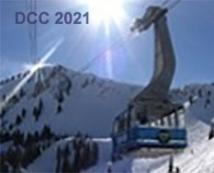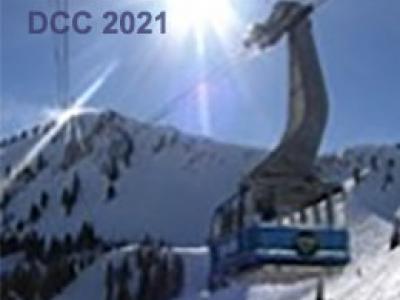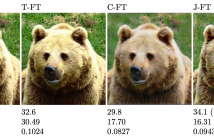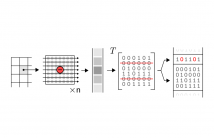
DCC 2021Virtual Conference - The Data Compression Conference (DCC) is an international forum for current work on data compression and related applications. Both theoretical and experimental work are of interest. Visit DCC 2021 website.

- Read more about A Grammar Compressor for Collections of Reads with Applications to the Construction of the BWT
- 1 comment
- Log in to post comments
We describe a grammar for DNA sequencing reads from which we can compute the BWT directly. Our motivation is to perform in succinct space genomic analyses that require complex string queries not yet supported by repetition-based self-indexes. Our approach is to store the set of reads as a grammar, but when required, compute its BWT to carry out the analysis by using self-indexes. Our experiments in real data showed that the space reduction we achieve with our compressor is competitive with LZ-based methods and better than entropy-based approaches.
- Categories:
 78 Views
78 Views
- Read more about A Viewport-Adaptive Rate Control Approach for Omnidirectional Video Coding
- 1 comment
- Log in to post comments
For omnidirectional videos (ODVs), the existing o-line coding approaches are designed based on the spatial or perceptual distortion in a whole ODV frame, ignoring the fact that subjects can only access viewports. To improve the subjective quality inside the viewports, this paper proposes an o-line viewport-adaptive rate control (RC) approach for ODVs in high eciency video coding (HEVC) framework. Specically, we predict the viewport candidates with importance weights and develop a viewport saliency detection model.
DCC21.pptx
- Categories:
 65 Views
65 ViewsIn the Versatile Video Coding~(VVC) standard, adaptive loop filter~(ALF), including Geometry transformation-based Adaptive Loop Filter~(GALF) and Cross Component Adaptive Loop Filter~(CCALF), plays an essential role in reducing compression artifacts. However, it also has high coding complexity and requires many picture buffer accesses in the encoder that will increase external memory access and is unfriendly to the software and hardware design.
- Categories:
 371 Views
371 Views
- Read more about COMPRESSING DEEP NETWORKS USING FISHER SCORE OF FEATURE MAPS
- Log in to post comments
We introduce a new structural technique for pruning deep neural networks with skip-connections by removing the less informative layers using their Fisher scores. Extensive experiments on the classification of CIFAR-10, CIFAR-100, and SVHN data sets demonstrate the efficacy of our proposed method in compressing deep models, both in terms of the number of parameters and operations.
- Categories:
 223 Views
223 Views
- Read more about End-to-end deep-learning-based image compression for machine tasks, a study
- Log in to post comments
This paper provides an in-depth study of a framework consisting of combining trainable im- age and video codecs with machine task algorithms. The field of video coding optimization for machines is gaining traction, due to the increasing share of image and video content that is dedicated to be analyzed by machines, rather than viewed by humans. Recent works in image compression have demonstrated the potential of end-to-end deep-learning-based auto-encoders that can be trained to optimally compress images and videos with respect to a target rate and any given differentiable quality metric.
- Categories:
 65 Views
65 Views
- Read more about ndzip: A High-Throughput Parallel Lossless Compressor for Scientific Data
- Log in to post comments
Exchanging large amounts of floating-point data is common in distributed scientific computing applications. Data compression, when fast enough, can speed up such workloads by reducing the time spent waiting for data transfers. We propose ndzip, a high-throughput, lossless compression algorithm for multi-dimensional univariate regular grids of single- and double-precision floating point data.
- Categories:
 127 Views
127 Views
- Read more about Flow-grounded Dynamic Texture Synthesis for Video Compression
- Log in to post comments
- Categories:
 46 Views
46 Views
Data compression is used in a wide variety of tasks, including compression of databases, large learning models, videos, images, etc. The cost of decompressing (decoding) data can be prohibitive for certain real-time applications. In many scenarios, it is acceptable to sacrifice (to some extent) on compression in the interest of fast decoding.
- Categories:
 46 Views
46 Views
- Read more about Compact Polyominoes
- Log in to post comments
We provide a compact representation of polyominoes with n cells that supports navigation and visibility queries in constant time.
- Categories:
 18 Views
18 Views